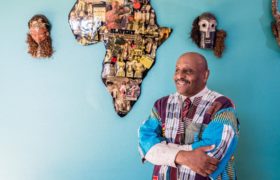At the intersection of 27th & Center, there’s a historian who is generations in the making.
“My name is Clayborn Benson III. I’m proud of my name, I work hard to make sure I’m not called Clay. I am Clayborn.”
Today Clayborn Benson III is a genealogist and a founder of the Wisconsin Black Historical Society Museum. Before founding the museum, Benson worked as a photojournalist at WTMJ for over 30 years. The privileges of the job, and the unique opportunities afforded to him as the descendent of generations of brick layers and concrete masons, were not lost on Benson.
“I traveled the entire world, and for most people that would’ve been the ultimate experience” he reminisced, “but looking back, all those things simply drew me into what I’m doing right now, right here.”
On the surface, Benson’s museum looks like any other traditional historical museum. On the ground floor are exhibits about the first Black Americans to settle in Wisconsin, the kinds of jobs Black Milwaukeeans typically took in the early 20th century, and so on. The upstairs of the museum is packed with boxes full of census records, birth and death certificates, and city directories that Benson uses for his genealogical research.
But in addition to these more traditional historical documents, Benson also collects personal narratives, written by residents of Milwaukee. While traditional historians might look at such documents with suspicion, sorting out what parts of the story can be corroborated and what parts should be thrown out as hearsay, Benson accepts these narratives wholesale as unique historical documents that allow us to get to know our ancestors in ways that isolated facts and figures simply cannot achieve.
As an example, Benson told me of the effect one woman’s story had on the way history will remember her, starting with the people that knew her. Throughout much of her life, people had trouble understanding her because of her accent, which Benson says led people to think she was not very intelligent. Had her personal narrative not been written out, her story, and the way her descendants would remember her, would’ve have ended here.
However, when she wrote her own personal narrative, suddenly her story no longer revolved around her intelligibility, but rather her contributions to her community and her sharp wit. Benson maintains that by writing out her narrative, historians would now have to remember her as a unique contributor to her community, and that she “insisted on you respecting her” for those contributions, and not labeling her as someone with an unintelligible accent.
For many, history was presented in school as a list of facts about certain people, or a list of dates deemed important by traditional historians for one reason or another. For Benson, this is the wrong way to approach history, one that bored him when he was in school. This understanding of history, which encourages the rote memorization of certain facts and figures from an abstract past, isn’t just missing one or two critical elements, it’s missing the point entirely. If the goal of history is to understand what happened to make the world what it is today, then
At the Wisconsin Black Historical Society Museum, as well as in his own genealogical research, Benson aims to bring history to life by deliberately making it personal for everyone who walks through the museum’s doors. “I’m empowering people to look beyond the kings and the Harriet Tubmans to be the best they can be, whether that be as an accountant, street sweeper, or whatever.”
By looking at history through a personal lens, and building a historical narrative relating to your own world, history becomes more tangible. Instead of thinking of history as the stories of isolated figures seemingly far removed from our world, history becomes a mosaic of personal stories contributing to a greater whole. It becomes the story of how you and your neighbors, not faraway kings or diplomats, have shaped the world and continue to shape the world every day.
If this sounds like more of a spiritual endeavor than a scholarly one, Benson would agree. When your notion of history revolves around your personal experience, rather than an intangible timeline occupied by stories of distant people and places, Benson says you will inevitably walk around with greater purpose. Suddenly, everything you do is infused with a deeper meaning that is generations in the making.
“All of the things that I have done in my entire life have prepared me for this moment,” Benson says, “and I listen to my spirit. I listen to my ancestors tell me that this is the right thing for me to do.”
As a 24-year-old trying to find my footing in life, I immediately interpreted this generational build-up to my everyday life as a form of immense pressure. Did my ancestors really do all they did just so I can spend my weekends in front of Netflix? I asked Benson if he felt a similar pressure to build a life that would inspire generations after him.
“Pressure?” Benson asked back “Are you kidding me? I’m in heaven! This is what I’m supposed to do. I love what I do. Whether I’m rejected over here or over there, none of it matters, because I get to continue to do this.”
“It takes time and energy to reveal who you really are” Benson added, and his use of genealogy to do this is something that he insists anyone can do. Of course, while Benson values personal narratives as legitimate historical documents, this doesn’t mean he doesn’t recognize the importance of traditional documents like census records or birth certificates when doing your own genealogical research. But before you dive into the line-item world of census records to learn about your family history, Benson advises doing two things to help flesh out your family’s recent history.
First, find the stories behind the items and photos in your home, and talk to your extended family about the items and photos in their homes. These items reveal much about the everyday life of you and your family that is difficult to capture otherwise, and that your descendants can’t find in census records.
Next, you write your story, starting with a couple of pages, and then expanding upon it. “The key is to build on it,” Benson advises, “year to year, things you remember, photos that remind you of something, another point of view on something that occurred.”
“Your story is vital. You can’t totally depend on your family, but you can depend on your story, and how your story is told.”
This Saturday, Ex Fabula and the Wisconsin Black Historical Society invite you to share your family history story at Benson’s museum. You can find more information here.






Leave A Comment